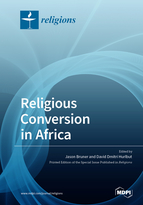Religious Conversion in Africa
A special issue of Religions (ISSN 2077-1444).
Deadline for manuscript submissions: closed (1 April 2020) | Viewed by 29598
Special Issue Editors
Interests: global Christianity; colonialism; British empire; religious conversion; East Africa; evangelicalism; revivalism
Special Issue Information
Dear Colleagues,
This is a call for essays for a special issue of the peer-reviewed international journal Religions on the topic of religious conversion in Africa. Over the past decade, scholarly attention has focused on the “explosive” expansion of Pentecostalism across the African continent and its narrative of discontinuity with the pre-Pentecostal lives of Pentecostal adherents. This sophisticated research has demonstrated how the emic prioritization of rupture within the Pentecostal discourse of conversion was predicated on a desire to overcome the dysfunction and insecurity of life in neoliberal Africa.
The predominance of Pentecostal Christian practices and discourses within this literature has shaped recent investigations into conversion in three ways:
First, it has marginalized concurrent processes of religious change in Africa that do not necessarily conform to a discourse of rupture. These include, for example, the expansion of East Asian religions (e.g., Hinduism), the growth of new expressions of Christianity (e.g., Russian Orthodox Old Believers and Jehovah’s Witnesses), or the movement from one Christian denomination or tradition to another.
Second, the prioritization of rupture has meant that discussions about the role of cultural endurance and continuity in religious change have fallen largely out of fashion. There are material and psychological realities, however, such as abiding social relations with half-siblings from a polygamous marriage or the language(s) one speaks, that cannot be wished into oblivion following conversion.
Third, even as recent literature on conversion in Africa has reinvigorated scholarly inquiries into the phenomenon of conversion and religious change, it often reproduces older theories’ assumptions about the direction of religious conversion, from “traditional religions” to “world religions”. As a result, developments such as the reemergence of African indigenous religions through the advent of spiritual tourism and their spread throughout diasporic communities (e.g., Vodún in Benin, and Orisa in the Americas) are undertheorized with respect to conversion.
In light of these observations, we invite essays from any historical era, methodological approach, and theoretical framework that seek to make original contributions with respect to conversion and religious change in Africa. We especially welcome essays that interrogate issues of method with respect to source material, offer critical assessments of theories of conversion with respect to religious change in Africa, and are based in contexts beyond Christianity and/or Pentecostalism.
Authors who are interested in submitting an essay to this special issue should send a 250-word abstract of his/her/their paper to the guest editors at [email protected] and [email protected] by 1 September 2019. Notification of accepted proposals will occur by 1 October 2019. Final manuscripts will be due on 1 April 2020. All essays will be peer reviewed.
If you have any questions, please feel free to email the guest editors.
Sincerely,
Dr. Jason Bruner
Mr. David Dmitri Hurlbut
Guest Editors
Manuscript Submission Information
Manuscripts should be submitted online at www.mdpi.com by registering and logging in to this website. Once you are registered, click here to go to the submission form. Manuscripts can be submitted until the deadline. All submissions that pass pre-check are peer-reviewed. Accepted papers will be published continuously in the journal (as soon as accepted) and will be listed together on the special issue website. Research articles, review articles as well as short communications are invited. For planned papers, a title and short abstract (about 100 words) can be sent to the Editorial Office for announcement on this website.
Submitted manuscripts should not have been published previously, nor be under consideration for publication elsewhere (except conference proceedings papers). All manuscripts are thoroughly refereed through a double-blind peer-review process. A guide for authors and other relevant information for submission of manuscripts is available on the Instructions for Authors page. Religions is an international peer-reviewed open access monthly journal published by MDPI.
Please visit the Instructions for Authors page before submitting a manuscript. The Article Processing Charge (APC) for publication in this open access journal is 1800 CHF (Swiss Francs). Submitted papers should be well formatted and use good English. Authors may use MDPI's English editing service prior to publication or during author revisions.
Keywords
- Religious Conversion
- Religion
- Ethnography
- Anthropology of Religion
- History of Religion
- New Religious Movements
- African Traditional Religions
- African Christianity
- Islam
- Africa







